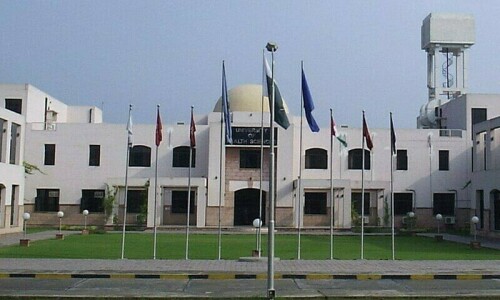MULTAN: Bahauddin Zakariya University Vice Chancellor Dr Khawaja Alqama says there is a need to study the history of the country to understand its federation and problems.
He was addressing the concluding ceremony of a two-day conference on “Deconstructing Federalism, Security and Inequality: Untold Narrative from the Periphery” organised by Pakistan Studies department of the BZU here on Friday.
The VC said Pakistani history, through the Indus and Gandhara civilizations, had the potential to resolve the problems of the country, an aspect which was unfortunately neglected. He hoped the conference would be a beginning of the academic efforts to find solution to the political and cultural problems of the country.
Professor Khurram Qadir asserted Pakistan formed a historical federation around the Indus River civilisation and the people living in the region had been natural allies since centuries.
Dr Muhammad Mushtaq, head of the Department of Political Science & International Relations, University of Gujrat, said the centre-province relationship in Pakistan historically remained uncomfortable but recently, the federation had made an effort to satisfy the numerous autonomy demands of smaller provinces through the 18th Amendment. However, the development had underpinned the mobilisation of minority groups for creation of new provinces.
“But, the majority groups and assemblies of respective provinces seem reluctant to endorse such demands. The approval of the resolutions for the restoration of Bahawalpur province and creation of the province of South Punjab by the Punjab Assembly has been considered as counteract by the supporters of the Seraiki province,” he said.
He said that on account of inadequate parliamentary support in concerned provincial assemblies, the advocates of new provinces had raised the issue in the National Assembly.Dr Raja Aamir Hanif said the unconstitutional steps by the political heads had resulted in instability in political system, causing the state a great political loss.
He said that over-centralization had resulted in largest province seceding from the federation. Although provinces were revived, yet they were denied their political, economic, and cultural rights, resulting in polarisation between federation and provinces on one hand and amongst the provinces on the other.
Dr Omer Farooq Zain and Asma Faridi of BZU International Relations Department said the structure of Pakistani polity was blemished by the practices of a particular group trying to maneuver political system.
They said burden of blame rested on the most abhorrent dominated ethnic groups, Punjabi and Pashtoon, that first faced the wrath of Bengalis and then multiple ethnic identities like Sindhi, Baloch and Seraiki, etc.
They said civil and military bureaucratic structure of Pakistan was directed by leading role of Punjabi-Pashtoon nexus. The dominancy was on the credit of Punjabi and Pashtoon military bureaucrats and political elite that paved the way towards malfunctioning of the federation, they said.
Prof Dr Saiqa Imtiaz Asif of BZU’s English department said among the multitude of markers of identity, language was considered essential to the maintenance of group identity. She said that in the 1960s the Seraiki middle class living in Punjab had reacted to the threat to their language and identity posed by the Punjabis and set out to develop an ethno-national consciousness in order to resist the assimilation of their ethnic group and language.
She said the Seraiki movement was the combination of the phenomenon of language planning and efforts to establish a collective identity to convince the Seraikis and others of the status of Seraiki as a separate language distinct from Punjabi.
Divide Jones of Quaid-e-Azam University discussed the concepts of failed states and failing states, saying that Pakistan was not a failed state. Regional Head of Attock Campus of Allama Iqbal Open University Malik Tauqir Ahmad Khan, Farah Gul Baqai of National Institute of Historical and Cultural Research, Dr Sajid Mahmood Awan of Quaid-e-Azam University and Dr Muhammad Shafique of BZU also spoke.
Pakistan Studies Chairman Dr Farooq Taunsvi was the convener of the conference.












































Dear visitor, the comments section is undergoing an overhaul and will return soon.